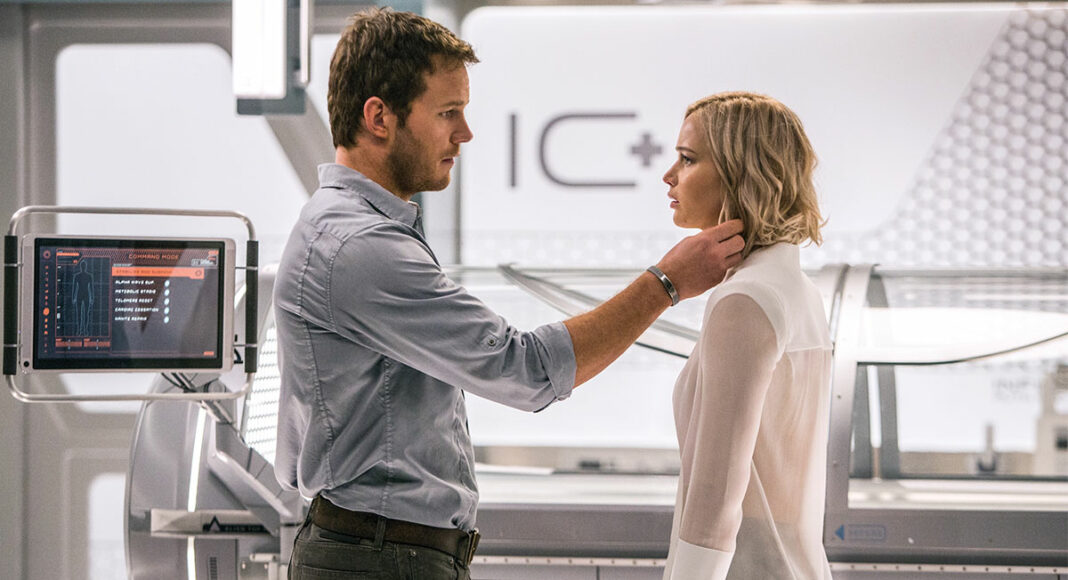They don’t exactly “meet cute.” But as the only two people suddenly awake in the middle of a lengthy space voyage, their destiny is more inevitable than most romantic movie couples in Passengers, a rare, thoughtful sci-fi drama in which characters and human nature are far more important than immense CGI effects.
Directed by Norwegian filmmaker Morten Tyldum (The Imitation Game), from a script by Jon Spaihts, the movie ponders essential questions of the human condition within the minimalist context of a two-character drama. The story begins in deep space aboard the Starship Avalon, which has departed from Earth to colonize a planet designated as Homeworld II by the corporate entity in charge of colonization. The ship’s 258 crew members and 5,000 passengers are in hibernation chambers during the 120-year voyage, as the ship purrs along on automatic.
But a malfunction in the system accidentally pops passenger Jim Preston (Chris Pratt) out of his sleep pod a mere 30 years into the voyage. His awe at finding himself in deep space, and having the complete run of the ship (including access to a tethered space suit that allows him to float among the stars) soon gives way to crushing loneliness. Unable to return to hibernation, with 90 years of the voyage left to go, he faces spending the rest of his life on the ship with no one for company but holograms, and an android bartender called Arthur (Michael Sheen), programmed to mix drinks, lend a sympathetic ear, and dispense cheerful platitudes.
After a year of despair, Jim makes a moral decision that will have repercussions throughout the rest of the story. He’s soon joined by fellow passenger Aurora Lane (Jennifer Lawrence), a journalist who joined the expedition to record the story of colonization for future generations. Jim is eager to leave his possibly dodgy past. (When he first wakes up, he doesn’t even seem to know where he is, or why, suggesting he was recruited and signed up in haste.) Her motives are just the opposite: looking forward to a future she can’t even imagine.
Aurora is also horrified to have wakened too soon. Jim has a background in mechanical engineering, but they exhaust every possibility for re-hibernating. (As in most computer systems, the ship’s “Help” program is completely useless). Along the way, making use of all the high-tech recreational facilities the ship provides—jogging around the decks, swimming in the pool, taking part in a life-sized, hologrammatic dance-off game—they start to bond with each other.
Out of necessity, they begin warming up to the reality of spending the rest of their lives together. But there’s still plenty of room for romance, as Pratt’s tender-hearted Jim practices his old-fashioned wooing skills, and Lawrence’s vibrant Aurora responds with passionate gusto. Their relationship is heartfelt and frisky, until a horrible secret between them threatens to shatter everything.
The movie has the cool, antiseptic look we expect in sci-fi stories where machines are running everything. (Kudos to production designer Guy Hendrix Dyas.) Tiny robotic roombas skitter around the floors at the first trace of any disorder. The cold, empty corridors are unpopulated by any other signs of life or warmth, except for the burnished wood paneling and sparkling decanters in Arthur’s bar. Jim and Aurora are dressed mostly in black, white, and grey tones—which is why her red sheath dress has such impact when they go on their first “date.” The turquoise-blue water in the swimming pool, and the twilight purple starfield beyond the bubble that encloses it, evoke the idea of serenity within unimaginable vastness.
There are thrills as the ship continues to malfunction (like getting stuck in the pool during an episode of zero-gravity), and other surprises in the plot. But Tyldum wisely sticks to the human story at the center of this epic-looking tale of the vast, unchartered terrain of the human heart.
PASSENGERS
(***)
With Chris Pratt, Jennifer Lawrence, and Michael Sheen. Written by Jon Spaihts. Directed by Morten Tyldum. A Columbia Pictures release. Rated PG-13. 111 minutes.











